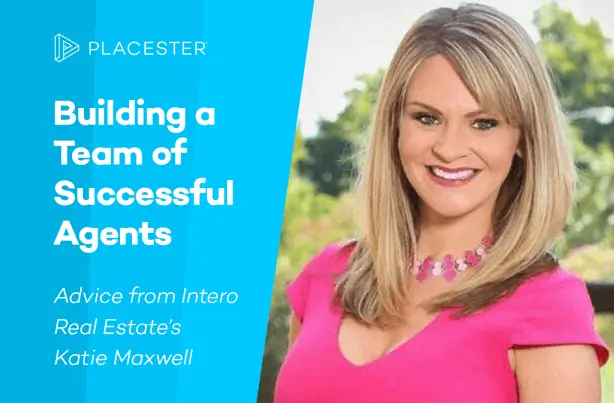There is no one right way to build a team of successful real estate agents. If you go around and ask 50 other brokers around the country their methods for how they find, hire, and retain the top Realtors, chances are you’ll likely get 50 different answers.
Now, that’s not to say you, as a broker yourself, can’t learn a thing or two from your industry peers. In fact, you won’t grow much in your role, or grow your team to your liking, if you don’t occasionally listen to others within the field — like Intero Real Estate Services Managing Broker Katie Maxwell — who have proven time and again they know what it takes to construct a thriving agent team.
Maxwell recently joined Placester for an insightful webinar, in which she outlined her advice for other real estate brokers regarding how they can identify the best Realtors to bring onboard their firms, continually aid those agents so they earn more, and — in turn — build highly successful real estate businesses. Continue reading to discover Maxwell’s tips and tricks for fellow brokers nationwide.
Hiring Millennials wasn’t Maxwell’s initial goal … but she’s more than happy to have plenty of them on her staff.
Few brokers ever go out of their way to bring on a very distinct type of top-producing Realtor to their firms, Maxwell pointed out. Having said that, there is a benefit to getting a younger generation of real estate pros with a proven track record.
“When we first opened, we built this really modern space that was pretty cool,” said Maxwell. “I’m a little bit younger than the average broker, the average office manager running a real estate brokerage, so we didn’t expect to recruit so many younger people, and that’s what happened. I think they were attracted to the brand and attracted to me as a leader within the office, and it worked out really well for us.”
Maxwell added that, without even meaning to, she’s cultivated an office environment filled with not just young people, but Millennials who are thriving beyond her imagination — and it’s pretty evident to see why.
“You’ll go into a lot of brokerages and maybe there’s a handful of younger agents,” Maxwell stated. “They bring so much energy — kind of like Miracle Grow for the office — and when they leave, it’s very disheartening to the broker because it’s kind of like the life blood of the office.
“Luckily, when you walk into our office, that’s 80% of what we have, which is nice, and when you have those agents who come to you new and [they] start producing, they attract others, because they’re on social media and they’re promoting themselves constantly, so they’re just major brand advocates. And that’s really how I pull in our new talent that comes in without me having to do the traditional recruiting calls.”
There are certain traditional aspects of brokerages that agents — young and old, new and experienced — desire.
Knowing that young agents make up the overwhelming majority of Maxwell’s brokerage, you may think these Millennials would be averse to working in a traditional real estate office, where they have to attend training sessions and weekly (or even daily) meetings.
What many brokers don’t realize, though, according to Maxwell, is these agents — and those of other demographics — actually want that traditional office structure to better their work habits and, over time, careers.
“I love [my team],” Maxwell noted. “They’re like my family. So when they get here, I try to give them leadership roles in the office, so someone who’s really, really good at something, I want them to lead the pack.”
The traditional means of real estate still works, and this younger agent wants it, and a lot offices, they’re not doing that.
Maxwell indicated she recently had to step out of the office for a week … but she didn’t let that stop her team from coming into the office to continue their ongoing real estate education and work with their colleagues to improve their sales and marketing strategies.
“I was gone for my birthday week,” said Maxwell, “and my really good agent team may not have been in the business for years and years, but they’re really excellent at prospecting and they’re really good at role-playing. I have them lead my office meetings, because I have never missed an office meeting … and a lot of people would think that’s something you don’t do anymore: ‘People don’t need to come to an office meeting.’ I highly disagree.
“The traditional means of real estate still works, and this younger agent wants it, and a lot offices, they’re not doing that. They’re not holding their agents accountable. They’re not giving them that feeling that they need to be in the office from time to time — and they lose them, because someone like me swarms in and gets them.
“They just want to be a part of something bigger, and when you offer that to them — hold classes for you or so on — they feel wanted and they love being a part of your office and they love making you money and themselves money at the same time. ”
Check out our article: “Meet Matt Wagner, Founder of Radio and Television Experts”
“Culture” is certainly a buzzword that’s overplayed … but that doesn’t mean you shouldn’t focus on improving yours.
Hiring the right individuals to join your brokerage is obviously priority number one, Maxwell stated. After you have the best real estate agents on your team, though, it’s time to turn your attention to retaining those people — and planning future recruitment to replace them, when they leave, which, in Maxwell’s experience, happens quite often, due to the age range of agents she employs.
“Culture is a very overplayed word,” said Maxwell. “You hear it a lot. It’s something, in our office, that we’ve worked very hard on. In the beginning, I don’t think I did. It just kind of happened. Then I realized what we have here.
“You have to understand that you need to embrace the people that you have and realize there’s constant turnover — not turnover like the agents are leaving, but, culture-wise, in our office, when we first opened, we had a good group of like 10 people that I brought in. What happens when you’ve got a group of 10 that turns into 20s, 30s, 40s in that [younger] demographic is they start meeting people, getting married, having kids, and maybe moving out of the city, and we learned that in a very interesting way.”
When agents start to build their lives and make personal changes that typically end with them leaving the firm or taking a reduced role, Maxwell stated she has a plan at the ready to get new blood in the brokerage.
“I learned at that moment that I constantly have to be bringing on those brand advocates and recruiting to replace those [agents] as they get older,” Maxwell said. “I know I’m not speaking anything about real estate, but it’s everything about real estate, because this industry is not one that you just go to work and come home and then it’s all over with.”
Regardless of how old an agent is at her firm, Maxwell teaches her team the proper real estate etiquette.
Though one could argue it’s mostly the younger real estate agent demographic that may need a lesson or two on how to interact with prospects, clients, and other Realtors, Maxwell noted it’s really every single one of her team members that occasionally needs a refresher course on how to speak and work with others to efficiently move deals from start to finish — and preferably without the use of emojis.
“What I’ve found with the 20-to-mid-30s, Millennial range is they’re very, very different in a positive way,” said Maxwell. “A lot of companies will train on purely real estate-type things … and that’s a hug mistake.
A lot of companies will train on purely real estate-type things … and that’s a huge mistake.
“I think training, especially if you’re working with a younger agent like this, or even older — it doesn’t matter — there are women and men alike that need training on how to hold themselves and how to speak to others, because we’re no longer a generation of people who speak face to face. My agents cannot speak to other agents who are 50 or 60 years old using emojis. It just doesn’t work, so they have to know how to shake a hand and they need to know what’s appropriate and not appropriate.”
Maxwell specified her particular brokerage offers a wealth of useful information her agents need to learn in order to be as professional as they can be. Without them, she noted, she’d be relying on her team to learn on their own time, and that’s the hands-off approach she constantly tries to avoid at all costs.
Click below to watch our entire webinar with Maxwell, and use her advice to enhance your real estate agent recruitment and training!

CLICK TO TWEET THIS ARTICLE







